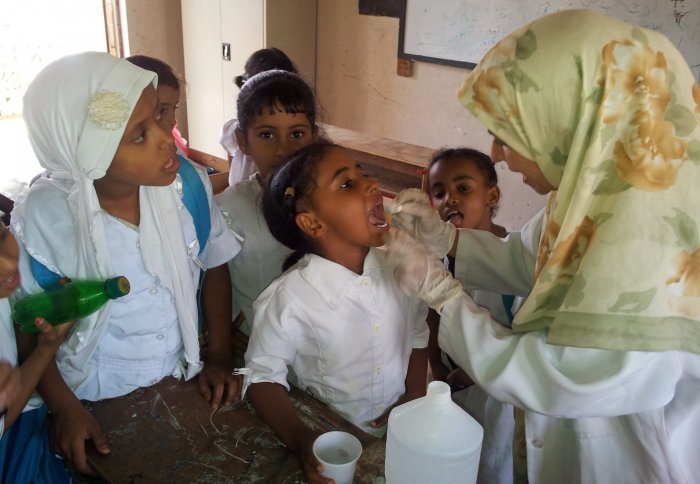Treatment forges ahead in Yemen

The national campaign against schistosomiasis and STH has treated 9.6million people during two campaigns this year in 263 of the 271 endemic districts
The national campaign against schistosomiasis and soil-transmitted helminths (STH) in Yemen continues to achieve impressive results. Across two campaigns in March and May this year 9.6 million people received treatment with praziquantel and albendazole/mebendazole. These campaigns were conducted in 263 of the 271 districts endemic with schistosomiasis (of a total of 334 districts in the country. Implementation in 8 districts in Lahj Governorate has been delayed due to security concerns).
These campaigns reached 5.4 million school-aged children (3.8 million enrolled children and 1.6 million non-enrolled children) across 19 governorates, as well 4.2 million adults.
In addition, over 30,000 people were trained as part of these campaigns (27,800 drug distributors and 2,900 team leaders), helping to ensure the continued success of the programme in the upcoming years.
Approximately 23 million tablets of praziquantel were used and 9.6 million tablets of albendazole/mebendazole (via donations by GSK/Children Without Worms) at a cost of approximately US$0.50 per person treated.
These campaigns constitute the second operational year of the programme. The programme aims to eliminate schistosomiasis-related morbidity from the project over its six year life-cycle. It is run by Yemen’s Ministry of Public Health and Population, funded by a US$28 million grant from the World Bank, and involves partnerships with the World Health Organization and the SCI.
The results were presented at a programme review meeting, held at the WHO-HQ in Geneva, and attended by His Excellency Dr. Majid Al-Jonaid, Yemen’s Deputy Minister for Primary Health Care, and by Dr. Lorenzo Savioli, Director of WHO’s Department of Control for Neglected Tropical Diseases.
The SCI provides technical assistance to the project. This is primarily achieved through its in -country technical advisor, Dr. Dhekra Annuzaili and London-based programme manager, Dr. Michael French. It also requires the invaluable input of the rest of the SCI team on such issues as Impact Evaluation, mapping, Knowledge, Attitudes and Practices surveys, and snail control.
Click here to read what has been reported on the WHO website
Article text (excluding photos or graphics) © Imperial College London.
Photos and graphics subject to third party copyright used with permission or © Imperial College London.
Reporter
Mrs Alexandra Grainger
School of Public Health